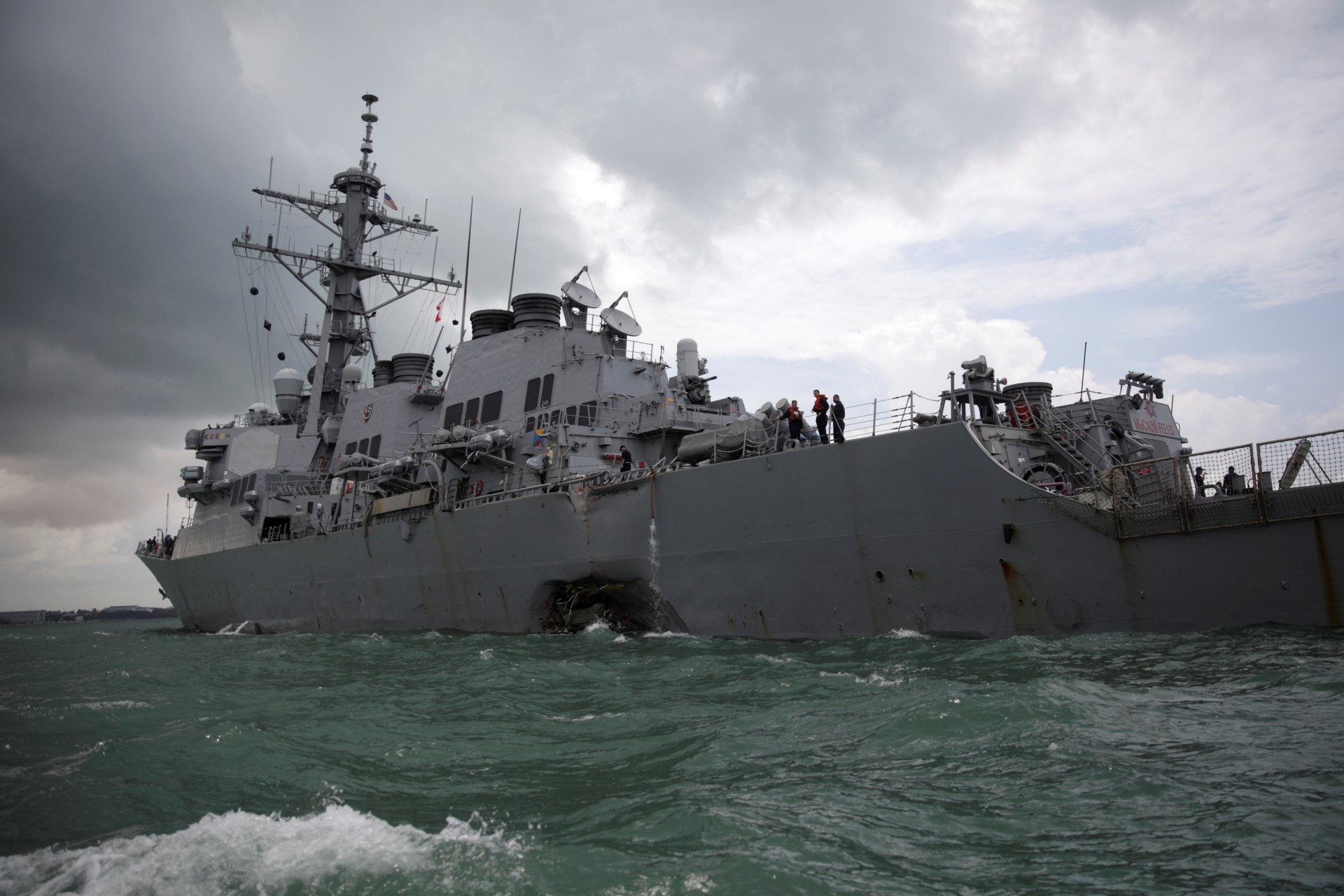A Cyber Norms Hypothetical: What If the USS John S. McCain Was Hacked?
There has been some wild speculation that a foreign nation might have hacked the navigation systems on the USS John S. McCain. Assuming it is plausible, what would be the implications for international law?

By experts and staff
- Published
By
- David P. FidlerSenior Fellow for Global Health and Cybersecurity
The collision between the USS John S. McCain and an oil tanker in the Straits of Malacca has led some to speculate—without any evidence—that the tragedy could have been caused by a foreign nation that hacked the destroyer’s navigation system. Some of the speculation connected the McCain collision with the incident earlier this summer when a container ship struck the USS Fitzgerald off the Japanese coast in June. The Fitzgerald investigation has turned up no indications of cyber foul play and identified other factors behind the collision, such as poor seamanship. The evaluation of the McCain incident will probably produce similar conclusions. However, the incidents provide an interesting hypothetical: how would international law treat the collisions if they were the result of state-sponsored cyber operations? And what would it mean for the cyber norms debate?
The Fitzgerald and McCain accidents resulted in significant damage to naval vessels and deaths and injuries to sailors. If done by a foreign nation, then hacking the navigation systems would be an illegal use of force under international law. As the Tallinn Manual 2.0 states, “consequences involving physical harm to individuals or property will in and of themselves qualify a cyber operation as a use of force.” Compromising navigational systems through cyber means clearly creates serious risks to ships and crew associated with collisions at sea, especially for ships, such as the McCain, sailing in heavily trafficked waters. Creating these risks satisfies the need for cause and effect to be closely related in acts considered uses of force under international law.
In this scenario, the targets were naval vessels not merchant ships, which means the hacking threatened and damaged core national security interests and military assets of the United States. In the peacetime circumstances of these incidents, no nation could argue that such a use of force had a plausible justification under international law. And every country knows the United States reserves the right to use force in self-defense if it is the victim of an illegal use of force.
Further, hacking maritime navigation systems implicates the law of the sea. The Fitzgerald was sailing through Japanese waters towards the high seas and exercising navigation rights protected by international law. A foreign nation’s hacking of its navigation system would interfere with Japan’s sovereignty over its territorial waters, the U.S. naval vessel’s right of innocent passage through Japanese waters, and the right of freedom of navigation on the high seas. The McCain was sailing in a location both Singapore and Malaysia claim is within its respective territorial waters, and any hacking of its navigational system would violate the sovereignty the legal regime of territorial waters accords to the coastal state. These rights in the law of the sea are so important for so many nations that their violation through navigational hacking would constitute a grave development.
This analysis highlights that, if a foreign nation hacked the Fitzgerald and/or McCain, the cyber operations would constitute, individually and collectively, a very dangerous escalation in cyber operations in clear violation of international law.
The prevailing modus operandi of states has been to conduct cyber operations that do not risk causing injury, death, significant property damage, or escalation into kinetic contexts. Much of the difficulty experienced with clarifying and applying international law to cyberspace has arisen because the vast majority of cyber operations take advantage of the technical and legal challenges of attribution, a permissive legal environment (e.g., concerning espionage), and/or long-standing difficulties in applying existing legal norms, such as the principles of sovereignty and non-intervention. For example, the Obama administration could not bring itself to categorize Russian efforts to interfere with the U.S. election in 2016 as a violation of the non-intervention rule.
In addition, as seen in the deadlock reached in the UN’s Group of Governmental Experts (GGE), some countries want less discussion of international law in the cyber realm. Hacking U.S. naval vessels would, instead, trigger more attention on the international law on sovereignty and the use of force that experts, such as Jim Lewis, identify as potentially promising areas for talks in the post-GGE context. Such hacking would strengthen U.S. preferences for clarifying the application of international law in cyberspace and, where necessary, the development of additional norms. It would also justify the efforts made in the Tallinn Manual project for sustained, authoritative analysis of the international law applicable to cyber operations.
Thus, hacking U.S. naval vessels would transform the relationship between international law and cyber operations and bolster U.S. positions on the application of international law in cyberspace. Why any adversary of the United States would risk these outcomes reinforces that the hacking speculation should not be taken too seriously.